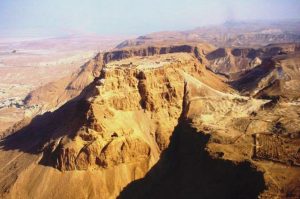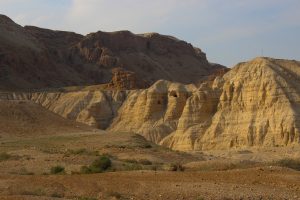The Pattern
Moses was given the prophetic forecast of events that lay ahead for Israel as a kind of spiritual genetic code. He was to write in a book what the Lord told him, and Israel was to keep it with the Ark of the Testimony. The Torah was a guide for the nation to understand and be aware of the consequences if they strayed from the moral tenets of their covenant with God.
(4Q398 14-17 i)
(13) And it (14) [shall come to pas]s when all these {things} (4.Q39714-21) [be]fall you in the en[d] of days, the blessing (15) and the curse, [then you will call them to mind] and retu[rn to Him with a]ll your heart (16) and all your soul (Deut. xxx, 1-2) at the end of days.
The prophecy concerning Israel’s blessing, curse, scattering and return is clear in Deuteronomy 30:1-6 and the Essenes quoted it in context of their time; the end of days for the nation of Judea and final scattering of Israel. The Essene’s rightly discerned their place in the chronology of events that Moses had recorded in the Torah.
(17) [And it is written in the Book] of Moses and in the Boo[ks of the Prophet]s that there shall come … (18) [and the blessings came] in the days of Solomon the son of David. And the curses (19) came from in the days of Jeroboam the son of Nebat (20) until Jerusalem and Zedekiah king of Judah were exiled that He will b[rin]g them to …
And we recognize that some of the blessings and curses which are (21) written in the B[ook of Mo]ses have come. And this is at the end of days when they will come back to Israel (22) for [ever] … and shall not turn back-war [ds]. And the wicked shall act (23) wickedly and …
Remember the kings of Israel and understand their works that each of them who (24) feared [the To]rah was saved from troubles, and to those who were seekers of the Law, (25) their iniquities (4Q398 14-17 ii conflated with 4Q399) were [par]doned.
Geza Fermes The Complete Set of Dead Sea Scrolls in English page 274
The ‘Exhortation’ calls on the people to understand the prophetic and the yet unfulfilled curses for disobedience. There is also blessing in the hope of salvation to those who turn from their wicked ways and pardon for the repentant as it had been for the kings who did what was ‘right in the eyes of the Lord’, as had king Hezekiah, leading Judah back to God in repentance and revival.[1]
The sons of Levi, Judah, and Benjamin, the exiles in the desert, shall battle against them in … all their bands when the exiled sons of light return from the Desert of the Peoples to camp in the Desert of Jerusalem; and after the battle they shall go up from there (to Jerusalem?).
Geza Fermes The Complete Set of Dead Sea Scrolls in English page 204
The ‘Exhortation’ also recognizes the coming exile would follow a failure by the leaders to discern the prophetic and turn to the Lord in repentance for the nation’s deliverance. They understood that there will be a time when the ‘exiled sons of light return from the desert of the Peoples’ to complete the judgment against the nation, its return and resurrection from the dead.[2]
In the commentary on Habbakuk, division is cited at the upper echelons of leadership as a ‘Wicked Priest’ will pervert the teaching of the ‘Teacher of Righteousness.’
Commentary on Habbakuk
[For the wicked encompasses] the righteous (i, 4c).
[The wicked is the Wicked Priest, and the righteous] is the Teacher of Righteousness…
[So] justice goes forth [perverted] (i, 4d). …
[Behold the nations and see, marvel and be astonished; for I accomplish a deed in your days, but you will not believe it when] II told (i, 5).
[Interpreted, this concerns] those who were unfaithful together with the Liar, in that they [did] not [listen to the word received by] the Teacher of Righteousness from the mouth of God. And it concerns the unfaithful of the New [Covenant] in that they have not believed in the Covenant of God [and have profaned] His holy Name. And likewise, this saying is to be interpreted [as concerning those who] will be unfaithful at the end of days. They, the men of violence and the breakers of the Covenant, will not believe when they hear all that [is to happen to] the final generation from the Priest [in whose heart] God set [understanding] that he might interpret all the words of His servants the Prophets, through whom He foretold all that would happen to His people and [His land].
Geza Fermes The Complete Set of Dead Sea Scrolls in English page 562
The curse would fall on Israel and exile would come as the Teacher of Righteousness would fully understand. He would interpret the prophetic with clear understanding and declare ‘all that would happen to His people and His land.’ He as the promised prophet like Moses in Deuteronomy 18:18 would be anointed to speak the truth from ‘the mouth of God’ and warn of events to come.
In the commentary called ‘The Words of the Heavenly Lights’ there is pleading for grace and deliverance for Israel to be delivered from the lands to which they were banished.
VI … [Thou hast taken away] all our transgressions and hast purified us of our sin for Thine own sake. Thine, Thine is righteousness, O Lord, for it is Thou who hast done all this! Now, on the day when our heart is humbled, we expiate our iniquity and the iniquity of our fathers, together with our unfaithfulness and rebellion. We have not rejected Thy trials and scourges; our soul has not despised them to the point of breaking Thy Covenant despite all the distress of our soul. For Thou, who hast sent our enemies against us, strengthenest our heart that we may recount Thy mighty deeds to everlasting generations. We pray Thee, O Lord, since Thou workest marvels from everlasting to everlasting, to let Thine anger and wrath retreat from us. Look on [our affliction] and trouble and distress, and deliver Thy people Israel [from all] the lands, near and far, [to which Thou hast banished them], every man who is inscribed in the Book of Life… serve Thee and give thanks to [Thy holy Name] … from those who vex them …
VII … who deliverest us from all distress. Amen! [Amen!]
Geza Fermes The Complete Set of Dead Sea Scrolls in English page 434
Yet the set time was still to come for Judea. In 131 CE Judea began preparations for a second war against Rome after Emperor Hadrian planned to establish a Roman colony in Jerusalem. Having Roman temples in the city ignited a resistance movement as it had 130 years earlier to Roman taxation. [3] The leadership took into account the mistakes of the Great Revolt not to repeat them. ‘Money was collected throughout the Diaspora; Rabbi Akiva himself traveled far and wide for the purpose, within the empire as well as beyond its borders.’ [4]
Rabbi Akiva (50 – 135 CE) is one of the most venerated Rabbis of Jewish history. As the leader of his generation, he became convinced that the prophets confirmed that the nation would be elevated over the Romans led by the messiah, as had the Sicarii leaders of the war in 66 CE. The ‘Bar Kochba Revolt’ began when a well-organized revolt under a command of young Judean general Simon Bar Kosiba, began to consistently defeat Roman forces. He was thereupon nicknamed “Bar Kochba” or “Son of Star,” and hailed by Akiva and the Sanhedrin as the messiah in fulfillment of the national destiny.[5] The name Son of Star was an allusion to a verse in Numbers 24:17 ‘there shall come a star out of Jacob’ referring to the star as the Messiah.
The war was lost, and the Romans and the Jews suffered heavy losses. The Roman government set out to punish the Jewish nation ‘to completely eradicate all Jewish settlement in Judea and to blur the national identity in the rest of the land.’[6] Hadrian had the remaining Jews removed from the land fulfilling the prophecies, confirming what the Essenes understood and the leaders along with Akiva, wrongly interpreted.
Traitor or Patriot?
Josephus Flavius, Yosef ben Matitiyahu, Joseph son of Matthias was a priest and served as a general during the Great Revolt. He was descendant of the Hasmonean dynasty and of a priestly order.[7] His faith and desire for knowledge of the beliefs of his people led him to study the three branches of Judaism, the Pharisees, Sadducees and Essenes.[8]
He was captured by the Romans after unsuccessfully defending his city of Jotapata. According to his testimony as a prisoner of war he accurately prophesied to the Roman general Vespasian of his imminent rise to become Caesar of the Roman Empire.[9] When the prophecy came to pass, Vespasian brought him to Rome giving him citizenship as a full member of his family, the house of Flavian.
Josephus has been branded since the Great Revolt as a traitor of his own people. But was he? He passionately defended his nation’s historical roots in an apologetic against its detractors.[10] Having lived with the Essenes and being familiar with their teachings and knowledge of the prophetic, it is more likely that he like they, accurately interpreted the events according to the prophetic timeline. Considering the final exile of Judea would not happen until some 30 years after his death, his interpretation of the prophetic timeline would be upheld as accurate, while the Rabbis misinterpretation was yet to bring about its dispersion.
Conclusion
The history of the Jewish nation, the testimony of the Essenes and Josephus’ account of the Great Revolt, confirms its prophetic destiny and a clear knowledge of it in the 1st century CE. The book of Isaiah and the other books of the bible found at Qumran have come back to us now at the gathering of the Jewish people and restoration of the state, validating the accuracy of the word of God and the wisdom granted those who truly seek Him.
9 Remember the former things of old: that I am God, and there is none else; I am God, and there is none like Me; 10 Declaring the end from the beginning, and from ancient times things that are not yet done; saying: ‘My counsel shall stand, and all My pleasure will I do’; 11 Calling a bird of prey from the east, the man of My counsel from a far country; yea, I have spoken, I will also bring it to pass, I have purposed, I will also do it. Isaiah 46
[1] 2 Kings 18:3
[2] Isaiah 11:12; 43:5; Ezekiel 37:1-10
[3] Yohanan Aharoni, Michael Avi-Yonah, Carta’s History of the Jewish People, Page 1781
[4] Michael Avi-Yonah, A History of the Holy Land, Page 162
[5] Yohanan Aharoni, Michael Avi-Yonah, Carta’s History of the Jewish People, Page 1791-2
[6] Yohanan Aharoni, Michael Avi-Yonah, Carta’s History of the Jewish People, Page 1859
[7] The Life of Flavius Josephus, 1 (1-6)
[8] The Jewish War, Preface 1.3; Antiquities of the Jews
[9] The Jewish War, Book III, Chapter 8.9 (399-408)
[10] Against Apion Josephus Flavius



